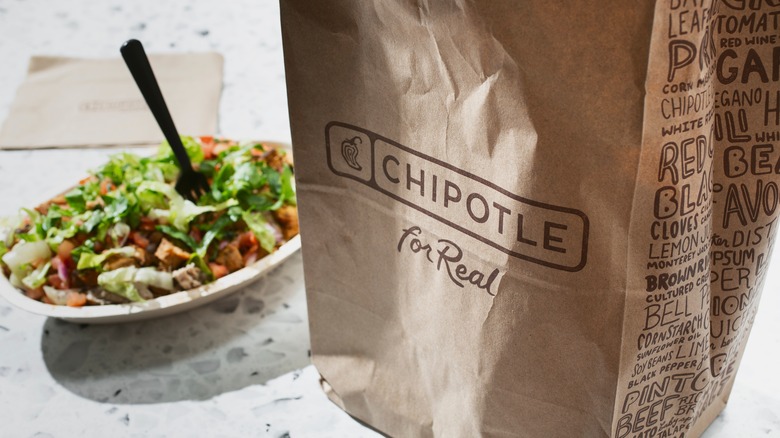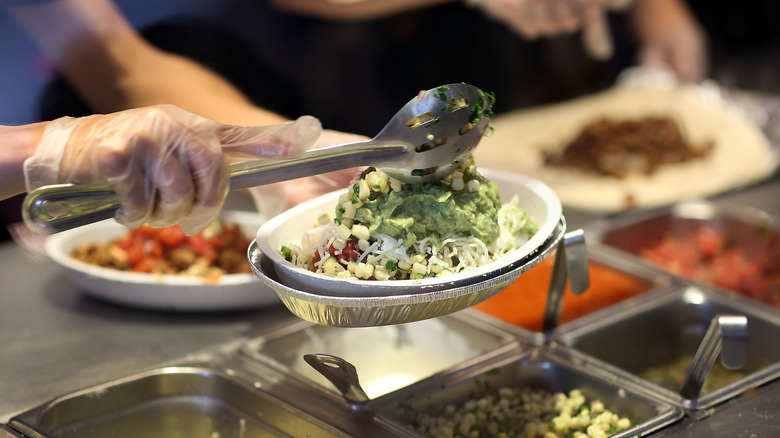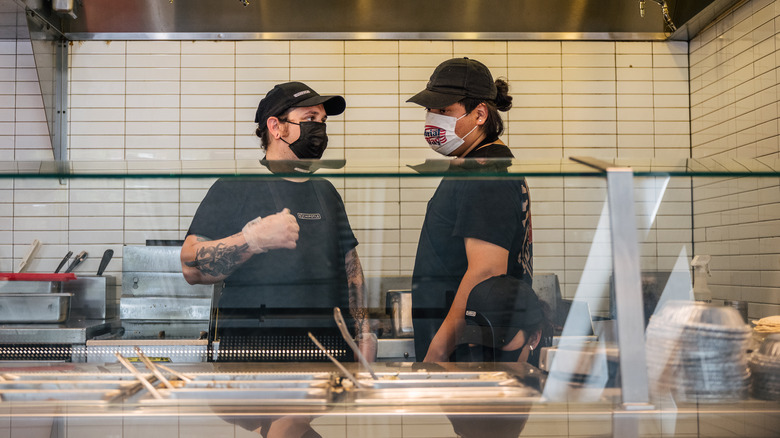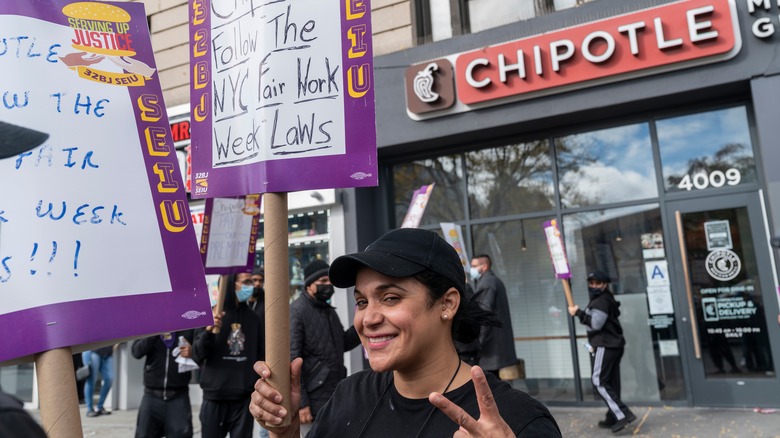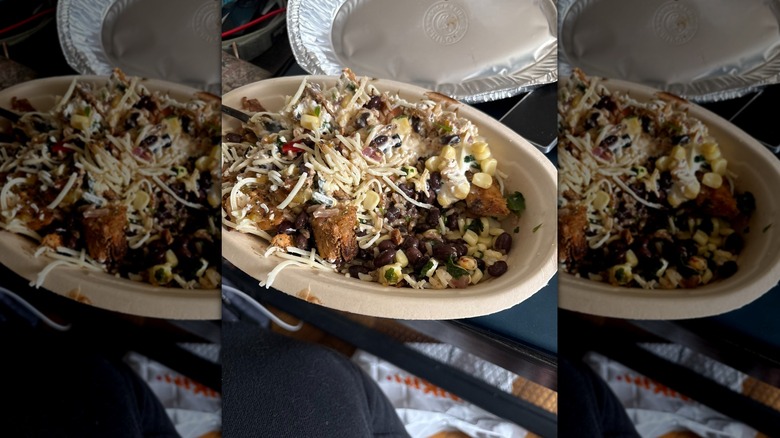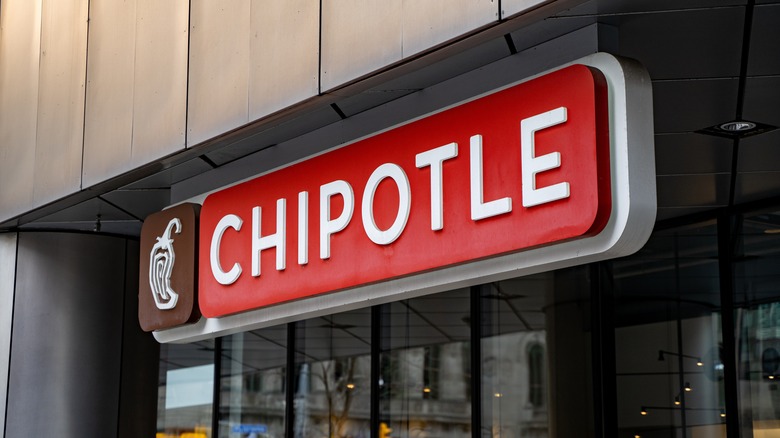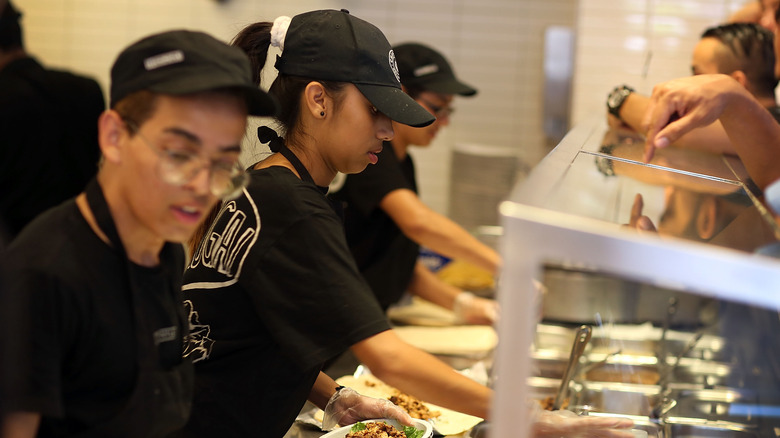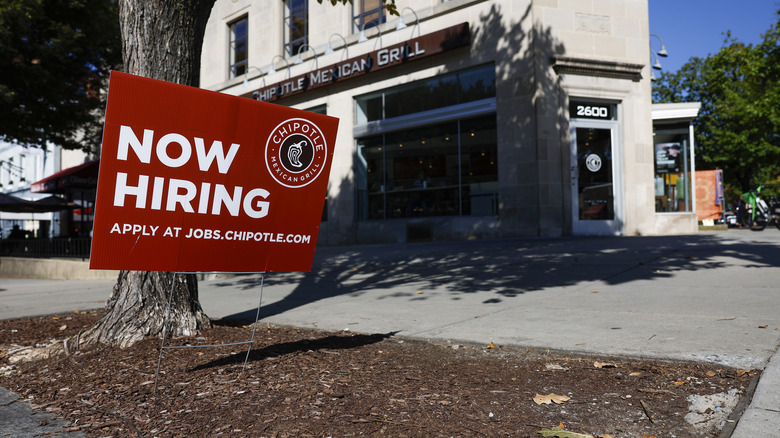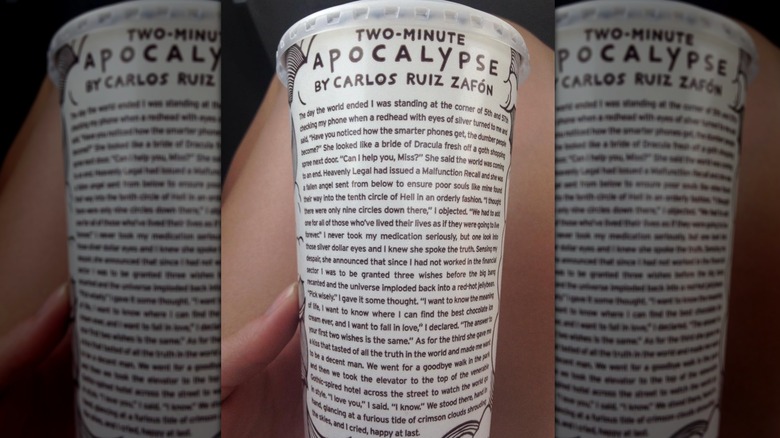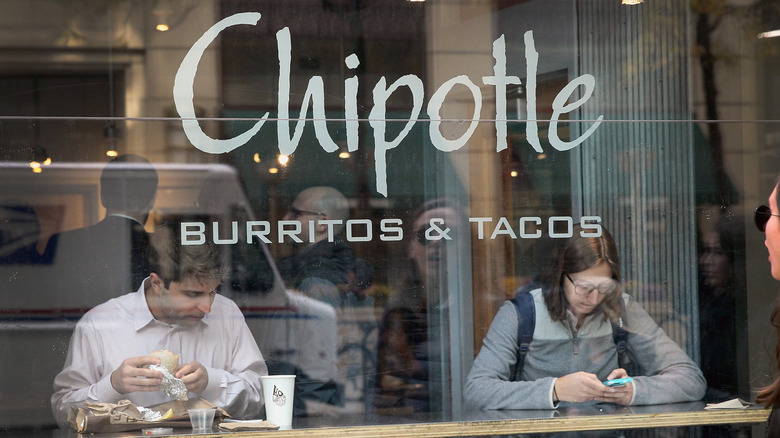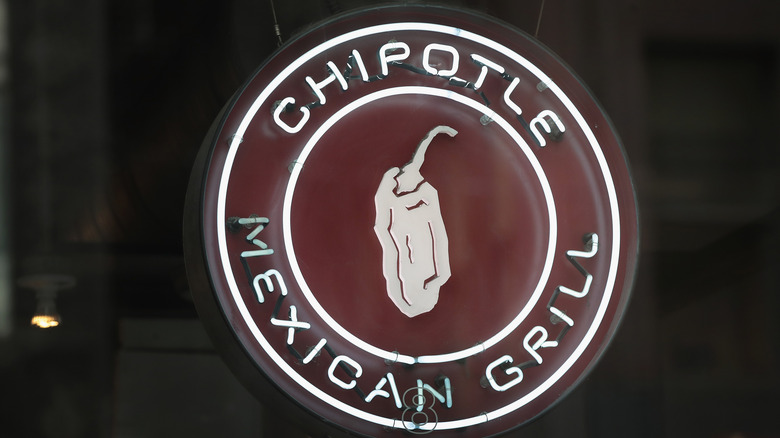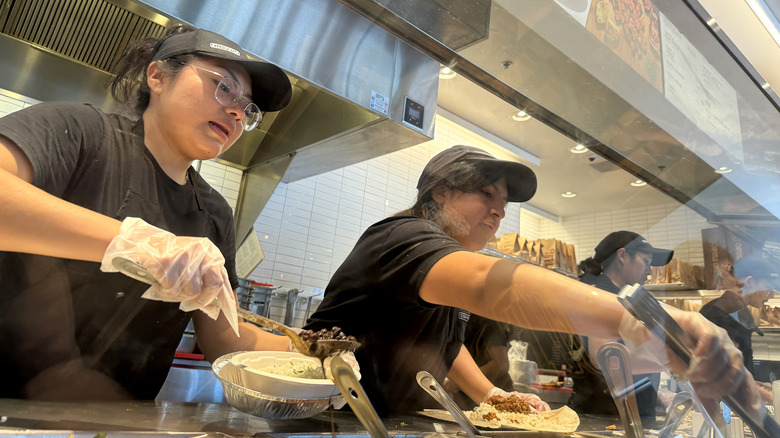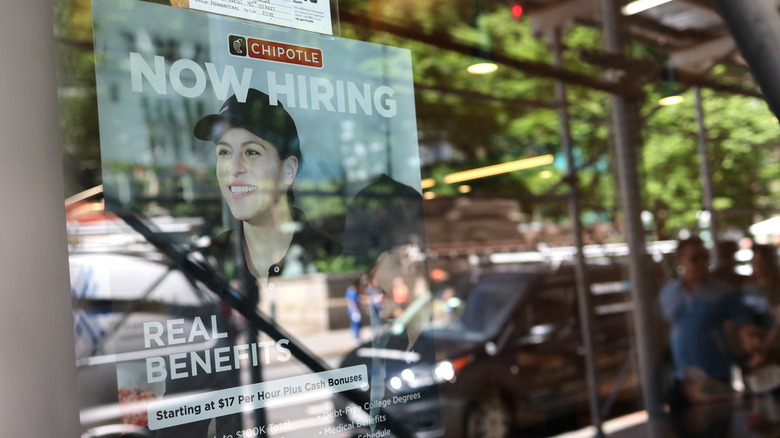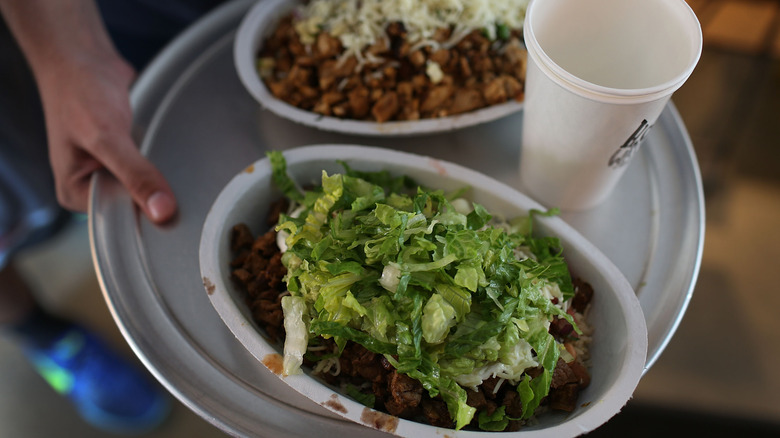13 Shady Things You Can't Ignore About Chipotle
Ask any Chipotle enthusiast and they'll tell you that, about 10 years ago, the fast casual chain was on top of its game. In the years between 2012 and 2015, Chipotle's food was fresh and perfectly cooked, the portions were absurdly large, and the chain's prices astonishingly cheap. Unfortunately, these good times have ended. The chain has been publicly struggling in recent years with negative stories about everything from Chipotle's food quality to its portion sizes making the news. Generally speaking, America just isn't hyped for Chipotle anymore.
Although some may feel pity for the international chain — which has locations in six countries — it is important to remember that, in some ways, Chipotle has brought this decline on itself. Several shady practices have long been associated with how Chipotle operates and lawsuits have been leveled against the company for issues including the violation of child labor laws to the chain withholding wage increases from unionized workers. What makes it even worse is that these lawsuits are just the tip of the iceberg.
It has been caused many food poisoning outbreaks
Pinpointing the moment Chipotle began its decline is simple: the latter half of 2015. During August of that year, 234 customers and employees at a Chipotle in Simi Valley, California fell ill after contracting Norovirus. Elsewhere during this month, a Salmonella outbreak ripped through 22 Minnesotan Chipotles and sickened 64 people who ate infected tomatoes. In October, an E.coli outbreak was linked to Chipotle restaurants across nine states. This outbreak saw 53 people fall ill with 20 of them requiring hospitalization. The following month, Norovirus struck again, this time in a Chipotle restaurant in Boston. 140 people were sickened.
The number and severity of these outbreaks indicated that something was wrong with Chipotle's food safety procedures. In fact, this run of outbreaks was so unbelievable that some people even believed that Chipotle was being sabotaged by short sellers. In an interview with Today during December 2015, Chipotle's founder Steve Ells said, "I have to say I'm sorry for the people that got sick. They're having a tough time. I feel terrible about that, and we're doing a lot to rectify this and make sure it doesn't happen again."
Unfortunately, the outbreaks kept coming. In April 2020, The Food and Drug Administration estimated that food served at Chipotle between 2015 and 2018 sickened at least 1,100 members of the public with some Chipotle customers even falling foul of clostridium perfringens bacteria. As a result, the company was fined $25 million.
It failed to pay some employees for overtime
There is nothing shadier than not paying employees for the hours they have worked, especially when those hours were above and beyond what was stipulated in their contracts. This is exactly what Chipotle was accused of in 2017 when an apprentice-level employee pointed out that they were not being paid overtime and were wrongly classified as exempt from overtime pay. After this issue was raised, Chipotle agreed to $15 million in back pay for the 4,500 affected employees. The average person received just under $2,000.
This was not the first time Chipotle has been accused of failing to pay overtime. In 2012, seven Chipotle employees sued the company after not receiving any wages for time worked above the 40 weekly hours stipulated in their contracts. An $8 million settlement was finally reached in 2021. While both of these cases were rectified after lengthy legal processes, they suggest Chipotle has a worrying tendency to not pay its workers what they are owed.
It's violated many labor laws
Chipotle is one of many fast food companies that seem unable to stop violating labor laws. Put simply, labor violations are breaches of employment laws that have been put in place to protect employees and regulate the relationship between them and their employers. Over the past decade alone, Chipotle has been accused of committing thousands of labor violations, each one to the detriment of its employees.
In Massachusetts between 2015 and 2019, over 13,250 child labor law violations were discovered across 50 Chipotle restaurants. These violations included teenagers working more than the 9 hour daily, and 48 hour weekly, limit. Teens were also hired without proper work permits. As a result of these breaches, Chipotle was forced to pay a $1.3 million fine.
In New York City, Chipotle was sued after it was discovered that the company was in breach of several labor laws. The chain failed to give its workers their schedules two weeks in advance and did not allow employees the requisite 11 hour break between shifts on consecutive days. Further violations involved workers' paid sick leave and their right to be offered more shifts prior to new staff being hired. Chipotle settled the case for $20 million.
Portion sizes vary massively
Of all Chipotle's woes, none have been as widely publicized as the controversy surrounding its portion sizes. It all began on TikTok where creators first complained of inconsistent portion sizes. Even Keith Lee, a creator who has previously partnered with Chipotle, called out the chain for its diminishing portion sizes. In an attempt to fight back, creators invented a technique, dubbed the 'Chipotle Phone Method,' which involves filming employees as they make the order, pressuring them into dishing out generous portions.
The online rhetoric soon became so loud that Chipotle was forced to respond. In an interview with Fortune in May 2024, Brian Niccol, Chipotle's former CEO, assured customers that its portions had not gotten smaller. Unfortunately for Niccol, a lot of people, including analyst Zachary Fadem, did not believe him. Fadem subsequently ordered 75 burrito bowls from eight Chipotle locations in New York City. Fadem found that the weight of the contents of the bowls varied by as much as 33%.
After these findings were announced, Niccol mentioned in an earning's call that, using customer surveys, the chain had learnt that around 10% of its restaurants failed to meet company standards when it came to portioning. He went on to note that these locations would re-emphasize training to ensure that correct portions were given to customers.
It was accused of keeping customers' change
During the summer of 2012, Chipotle was accused of rounding customers' bills to the nearest nickel. The chain did not deny it. In a statement to The Star-Ledger, Chipotle spokesman Chris Arnold said, "It's something we do in some high volume markets, including New Jersey. The way it works is that prices auto-round to the nearest quarter and that's indicated on the receipt. The idea is simply to limit the possible combinations of change on cash transactions to keep the lines moving quickly in high volume areas."
What Arnold failed to mention is that the line on the receipt that detailed this practice was only added once customers complained and that this rounding practice was in no other way publicized by Chipotle. The ensuing public outcry was so great that Chipotle soon changed its policy so that bills were only rounded down.
Chipotle was embroiled in another change-related scandal during 2020 when a proposed class action lawsuit was leveled against the company for not providing exact change in some customer interactions. However, this lawsuit was dropped as the country was experiencing a national coin shortage at the time and employees made a point of telling customers that they might not receive exact change.
Chipotle withheld wage increases from unionized workers
During July 2022, Chipotle employees working at a restaurant in Lansing became the first Chipotle team in the country to unionize. Since unionizing, senior members of Chipotle incorrectly told the workers that they were not eligible for raises other employees had benefited from because they were unionized, and Chipotle subsequently withheld this extra pay from the unionized employees. The National Labor Relations Board's general counsel has said it will raise a formal complaint unless Chipotle rectifies this and agrees to pay a settlement. The issue is ongoing.
The National Labor Relations Board has a history of standing up to Chipotle and winning. In March 2023, it was announced that Chipotle would pay $240,000 to 24 former employees after it permanently closed a store in Maine that had filed a petition to unionize. After the settlement was announced, Brandi McNease, a former employee of the closed store, said in a statement recorded by AP News, "This isn't just a victory for Chipotle United. It's a win for food service workers across the country. It sends a message to corporations that shutting down a store and blackballing workers didn't work for Chipotle and it won't work for them either."
It has a history of hiring illegal workers (and subsequently firing them)
During 2011, it was reported that Chipotle fired hundreds of allegedly illegal workers from its restaurants in Minnesota after the chain was audited by United States Immigration and Customs Enforcement. It is estimated that 450 undocumented Chipotle workers were fired at this time.
A subsequent investigation by Reuters discovered that Chipotle had some extremely questionable hiring practices with ex-employees saying they got jobs after admitting they didn't have the legal right to work in the U.S. In an interview with Reuters, Miguel Bravo an undocumented man from El Salvador who worked at Chipotle, said, "They don't have a modern system to verify documents... They didn't confront me at any moment, or ask me if my papers were good or if I was authorized to work legally in the United States." When United States Immigration and Customs Enforcement went on to audit Chipotle's Washington D.C. restaurants, a further 40 people lost their jobs.
What makes these dismissals more jarring is that this workforce directly contributed to Chipotle's success. At this time, the chain had an impressively high stock value which was largely based on its ability to keep labor costs low. Further hypocrisy was present as the chain, which sells Mexican-inspired foods, rapidly cut ties with its undocumented workers, the majority of whom were Latin American. As one protester's sign read at a demonstration: "Chipotle: You cannot sell Mexican food and then sell out Mexican workers."
It has done little to champion Mexican people or culture
Although the name Chipotle Mexican Grill might suggest otherwise, Chipotle is an American company. Of course, it has risen to prominence by commercializing and Americanizing certain aspects of Mexican cuisine and culture. The repurposing of another country's cuisine for a company's commercial gain is nothing new. However, Chipotle has gained a reputation for having a particularly unbalanced and exploitative relationship with the culture and cuisine it benefits from.
This was made most apparent during 2014 when the chain ran a campaign called Cultivating Thought wherein stories by 10 writers were printed on Chipotle bags and cups. Selected authors included Toni Morrison and Malcolm Gladwell but no writers of Mexican, or even wider Latin American, descent. In an interview with NPR, Alex Espinoza, an American writer that was born in Mexico, said, "I think it's just a big dis to not put our voices on a cup [for a company] that specifically bills itself as a 'Mexican grill [...] My concern is that it sends the message that we as Mexican-Americans are not capable of creating art."
Another criticism frequently leveled at Chipotle is that the chain does very little to introduce the public to authentic Mexican food. In fact, the chain has had the opposite effect, dominating the Mexican and Mexican-adjacent food market in the United States and subsequently skewing many Americans' perception of the cuisine.
Chipotle has raised its prices above inflation
Just about every restaurant chain operating in the United States has raised its prices in recent years. More often than not, these hikes are accompanied by a statement that names inflation as a key driver of the increase. While inflation has increased dramatically in recent years, many companies — Chipotle included — have been accused of price gouging; using rising inflation to justify un-proportionate price rises. Price gouging can be hard to prove, yet The Guardian reported that Chipotle's executives told investors they'd raised prices above inflation.
Chipotle's initial price raise wasn't much of a big deal. However, the company went on to raise its prices a further three times in short succession. All told, prices were raised four times in just a little over two years. This explains Chipotle's impressive ability to improve restaurant-level operating margins despite the economic downturn.
At the end of 2022, Chipotle's operating margin stood at 13.4%, up 2.7% from the previous year. The end of 2023 saw similar improvements with the company's operating margin being recorded as 15.8%. In other words, Chipotle continued to improve its profit margins despite increases in inflation and operating costs. While price raises don't completely account for the chain's increasing profit margin, they definitely contributed to it.
It's been accused of false advertising
On at least two occasions, Chipotle has been accused of false advertising. The second of these accusations came in November 2016 when three plaintiffs sued the chain after they consumed a Chorizo Burrito. An in-store sign used to advertise this burrito indicated that it only contained 300 calories. In fact, a single serving of the chorizo itself was 300 calories, and the actual caloric content on the burrito was over 1,000 calories. The case was settled in October 2017 with Chipotle changing all signage to include the correct calorie content. Each of the three named plaintiffs also received $5,000.
A far larger case was leveled against the chain in 2015 over concerns that, despite marketing its products as GMO-free, Chipotle was serving meat and dairy from animals that'd consumed GMO animal feed. After a lengthy, three year litigation process, the class action lawsuit was settled for $6.5 million.
The company has wrongfully terminated employees in the past
It's often said that the best way to measure a company is to see how it treats its staff. Unfortunately for Chipotle, the chain has not always stuck behind those who work for it. The starkest example of this came in 2015 when Chipotle manager Jeanette Ortiz was accused of stealing $636 from a safe in one of the chain's Fresno locations.
Ortiz, who had been employed by Chipotle for 14 years, was the one who placed the cash in a marked envelope and subsequently inside the restaurant's safe. She did this because employees who swapped large bills for smaller ones did not visit the Fresno location on one occasion. When the money went missing at a later date, it was Ortiz who notified management.
Initially, senior members of Chipotle claimed they had video evidence of Ortiz committing the crime but were then subsequently unable to produce it. Ortiz subsequently raised a wrongful termination lawsuit. During the lawsuit, it became apparent that members of Chipotle had sought to defame Ortiz by leveling the charges. Their motivation for doing so was to avoid honoring a worker's compensation claim that Ortiz had filed for a job-related injury.
It has used pictures of customers without their consent
Leah Caldwell was sitting in a Chipotle restaurant in Denver during 2006 on the same day that photographer Steve Adams was taking pictures of the store. After finishing her meal, Caldwell was leaving the store when Adams asked her to sign a release form. She said no. Eight years later, Caldwell walked into a Chipotle only to see a photo of her on the wall. She saw this photo in Chipotle locations in both Orlando and Sacramento. While undoubtedly her, the image had also been edited to include bottles of alcohol in the foreground.
Caldwell subsequently sued Chipotle alleging that the company had unlawfully used her image for advertising and marketing purposes. In the lawsuit, Caldwell asked for over $2.2 billion. While a huge number, Caldwell chose this amount because she believed it reflected the chain's profits between 2006 and 2015. According to the lawsuit, she also requested that the amount paid to her be increased when the 2016 end of year fiscal results were released by the chain. Chipotle and Caldwell eventually settled the lawsuit during 2017 for an undisclosed amount.
It has centralized some of its food production
In its early days, the Chipotle brand was built upon the promise of serving fresh and local food. It delivered on this promise by preparing ingredients in store, every day. However, the food poisoning cases that rocked the brand during the mid-2010s forced Chipotle to readdress its sourcing and food production practices. The chain moved the preparation of certain ingredients, including tomatoes, out of Chipotle restaurants and into centralized kitchens. It also began pre-cooking its steak using a sous vide.
While better from a food safety standpoint, moving certain food preparation steps from stores and into centralized kitchens negatively affected the quality and taste of Chipotle's food. Criticism was leveled against the chain's steak for being dry, overcooked, and tough. Customers and employees also decried the centrally prepared lettuce, calling it bland.
Customers have also noticed other foods that have declined in quality. However, some of these cannot be explained by Chipotle's food centralization strategy. For example, the chain's guacamole, which is made in house, has been served at some locations while oxidized and brown. This would indicate that some of the decline in food quality is more to do about staff training than it is the centralization of food preparation.
